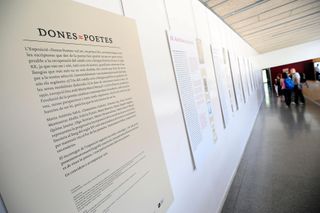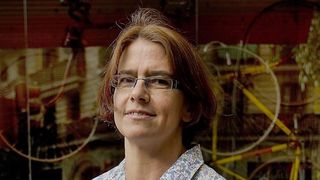- The Centre for Interdisciplinary Gender Studies (CEIG) works in a cross-cutting way with research groups and research staff to include the gender perspective in scientific research
- The aim is to confront the androcentric view of society, recover the contributions of women and demonstrate the importance of gender in areas of knowledge
The male-centred view that dominates our society has left behind many stories of women, many testimonies, contributions and female influences in various fields, and in scientific research. For centuries, many contributions of women to fields of knowledge, which were already limited by obstacles blocking women’s access to academia, have been silenced or overlooked. Furthermore, the research that has traditionally been carried out in many fields of knowledge has been conceived from an exclusively masculine point of view, which excludes women and, as a result, can lead to biased results.
Gender research works to recover and restore women’s contributions to knowledge areas, and to demonstrate the relevance of gender in all areas of scientific research. It is in this context that in 1999 the Rector's Board of the University of Vic - Central University of Catalonia (UVic-UCC) approved the creation of the Centre for Interdisciplinary Women’s Studies (CEID), which was renamed the Centre for Interdisciplinary Gender Studies (CEIG) in 2014. Since its inception, this centre has included a large group of teachers who work on gender issues individually or collectively.
«Gender research seeks to recover and restore the contributions of women, and demonstrate the relevance of gender in knowledge areas.»
An interdisciplinary challenge
The CEIG is committed to the interdisciplinarity of the subjects and works on research in a cross-cutting way, involving different research groups and chairs of the University, to encompass many areas of knowledge and avoid the androcentric perspective in any research. A clear example of this can be found in the range of research groups in the centre. They include the Gender Studies Research Group: Translation, Literature, History and Communication (GETLIHC), created in 1999 with several lines of research; Sports and Physical Activity (GREAF), which generates knowledge about programmes to promote physical activity in society; Educational Research (GREUV), which conducts research on education in different fields; Societies, Policies and Inclusive Communities, focused on analysing social, political and economic conditions of inclusion processes in a broad sense and the policies that derive from them; and Audiovisual Translation, Communication and Territory, which investigates multidisciplinary elements such as translation, communication and audiovisual accessibility. In addition, CEIG includes the UNESCO Chair in Women, Development and Cultures, shared with the University of Barcelona, which works to promote the construction of fairer, more plural societies from universities and academic knowledge. Finally, it collaborates with the Emprèn, research group, which works in the area of entrepreneurship and innovation.
On the basis of this network, the aim of the Centre for Interdisciplinary Gender Studies is to extend lines of collaboration beyond the research groups that encompass it and achieve cross-disciplinary activity in different areas. Among other actions, the group collaborates with research groups from seemingly distant fields, such as Aquatic Ecology (GEA), through the PONDERFUL project, or with external institutions such as Vic-Dones/SIAD-Osona Vic, which manages equality and LGTBI policies in the city and the region.
Gender perspective in all areas
“The gender perspective must be applied in projects and research where it has never been addressed or where it has little presence,” noted Gerard Coll, director of CEIG and researcher at GETLIHC. Thus, it is possible to carry out “gender” research, and to address, for example, issues such as the role of women in a given field over the centuries, gender bias in a specific context or the gender inequalities that exist in a specific sector. However, you can also do research in areas as diverse as aquatic ecology, health or engineering, and apply a gender perspective.
One example is in the field of medicine, as pointed out by Marina Geli, coordinator of the Centre for Health and Social Care Research (CESS) at UVic-UCC and director general of the Foundation for Advanced Studies in Health Sciences (FESS), during training on the gender perspective in scientific communication and dissemination. This training was held in April and May 2021 and organized by the Scientific Dissemination Unit, the Equality Unit and GEIC of UVic-UCC. According to Geli, there is a lack of gender-based research on diseases such as osteoporosis, of which very little is known about its impact on the male population; or myocardial infarction, with little evidence of the symptoms or effectiveness of treatments in female patients. “Without a gender perspective, our diagnostic and therapeutic practice is not good,” said Geli.
As Gerard Coll noted, it is a matter of “continuing to expand the dialogue with other areas of knowledge,” a process with a lot of potential, which allows us “to learn from areas that are far from us and rethink the research dynamics we apply.”
«We need to rethink the dynamics of research that we apply so that all research takes into account the gender perspective.»

The first step: a conscious university community
The first step in conducting gender-sensitive scientific research involves having a conscious university community that has the tools to apply the gender perspective in everyday activities. To achieve this at UVic-UCC, CEIG coordinates training for teaching and research staff and administrative and service staff. In this way, “the perspective is included in the modus operandi of the University in different areas, in addition to research,” such as in teaching, classrooms or in the coordination of final projects, explained Gerard Coll.
Another step is to participate in and lead an increasing number of research projects, and ensure that the gender perspective is addressed in more, increasingly diverse fields of knowledge. “We are actively working to not only act as support and collaborators, but also to lead more European projects,” said Coll, adding that “we want to create a Horizon2020 team to include and expand our involvement and commitment to gender research.”

GETLIHC, gender studies since the beginnings of the University
The tradition of gender research at UVic-UCC has existed since the beginning of the University. In 1999, the Gender Studies Research Group: Translation, Literature, History and Communication (GETLIHC) of the UVic was created. Twenty-three years later, the group continues to work in four lines of research, all within the framework of gender studies: biographical studies, which seek to increase the visibility of women from different eras and countries, with special emphasis on those from Catalan Countries; translation; historical, literary, and social studies; intersectionality; and sexual and gender diversity.
The first two lines of research are informative and radical, and focus precisely on one of the classic objectives of gender research: to recover and defend the work and contributions of women who have been forgotten through two approaches. “We want to recover and increase the visibility of female cultural figures, with a focus on Catalan intellectuals, defend them, and recover the work of writers and translators from different eras who have been made invisible by the dominant discourses,” explained Pilar Godayol, coordinator of GETLIHC.
PONDERFUL, ponds and lakes to cope with climate change
The PONDERFUL project (POND Ecosystems for Resilient Future Landscapes in a Changing Climate) is an H2020 research project led by the Aquatic Ecology Research Group (GEA). The aim is to study ponds and lakes to find out how they contribute to slowing down climate change and to use these freshwater bodies as nature-based solutions to deal with the climate emergency. In this area, which is seemingly far removed from gender research, the gender perspective is included as a requirement of the H2020 and new Horizon Europe calls. CEIG works with the GEA research group to apply this perspective in different areas.
“In the PONDERFUL project, the gender perspective was incorporated mainly in the package that deals with social issues,” explained ICREA researcher Sandra Brucet, who leads the project, noting that “for example, when we do surveys on how society perceives ponds and lakes, and the benefits that are derived from them, we will analyse whether there are differences between men and women.” In addition, an intersectional perspective is taken into account, which assesses other aspects that may go unnoticed, such as activities marked by gender, class, origin or age. “We also incorporated gender balance when we prepared the PONDERFUL proposal,” he continued, to achieve parity in participation and decision-making teams. Work harassment protocols are also applied in the team. Participatory workshops are held to take into account equality and different experiences.


CASES Project, interpersonal violence in the world of sports
The projecte Child Abuse in Sport-European Statistics (CASES) project has revealed that interpersonal violence against children and adolescents in the world of sport is a reality, but the prevalence of this violence is higher for boys than for girls. The CASES project has aimed to support the strategic efforts being made to prevent child abuse, exploitation and violence in sport; and to develop resources for the sports industry to help sports organizations ensure the well-being of children and adolescents. This research was led in Spain by researchers Montse Martín and Eva Cirera, from the UVic-UCC GREAF research group. The project was directed by Edge Hill University and also involved the Bergische Universität Wuppertal, the Universitäts Klinikum ULM, the University of Antwerp and the Universität Wien.
Montse Martín, a GREAF researcher, explained that in this project, the gender perspective is a cross-cutting issue as surveys to gather experiences were administered to 50% of men and 50% women. Unlike in the domestic sphere, where sexual violence against children occurs equally in boys and girls, “in the world of sports, boys and young men suffer more sexual violence than girls and young women,” remarked the researcher. Although the exact reasons are not known, it could be that the protection of girls and young women has something to do with it. “As it is thought that it does not happen to boys, the degree of protection of them may be lowered,” said Martín. In addition, according to her, sexual violence against boys is probably less talked about by the victim and is less visible due to cultural issues or feelings of embarrassment or shame.
From childhood
Research from a gender perspective can be applied to projects that study the process of training and teaching children through various approaches and methodologies. The commitment to integrating this view of UVic-UCC is cross-cutting in the federated entities. Two examples are the Writing for Inclusion (WIN) and Communities 4 Science (C4S) projects, which work on the gender perspective in research in childhood and adolescence.
The European Research Project Writing for Inclusion (WIN) works to develop resources and tools for care and prevention for inclusion through creative writing in the classroom, and is especially aimed at children aged 9 to 10 years. When students have to create the main character for a story, it is mostly male. “We give them reasons, examples, we tell them to look around, in the classroom, at their family, and see if there is a female presence, and from there we start working on gender,” explained Mireia Canals-Botines, one of the researchers leading the project, together with Àngel Raluy Alonso, Miquel Pujol Tubau and Núria Medina-Casanovas. “We need to change the trend and normalize the presence of women in all areas, as a step towards true inclusion,” she added.
The Communities for Scienceproject is carried out by the research group in Education, Neuroscience, Experimentation and Learning (GRENEA) of UManresa and led by Gabriel Lemkow Tovías with researchers Miryam Navarro Rupérez and Lluïsa Sort García on the team. C4S works with children between the ages of 0 and 16 to study and evaluate strategies that promote inclusive science education through active participation and increased visibility of scientists from vulnerable communities. Educational spaces, schools, museums and associations in Manresa are taking part in this project, which includes eleven institutions from eight countries.
